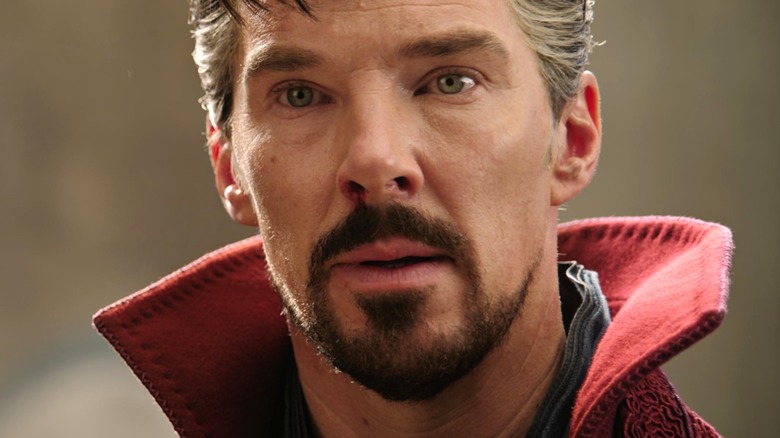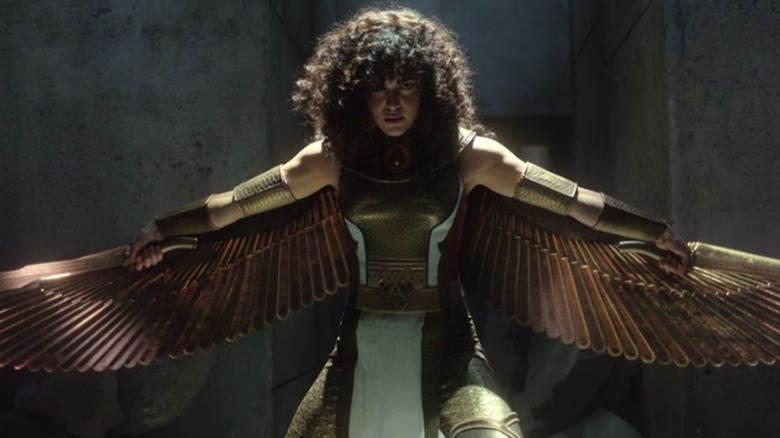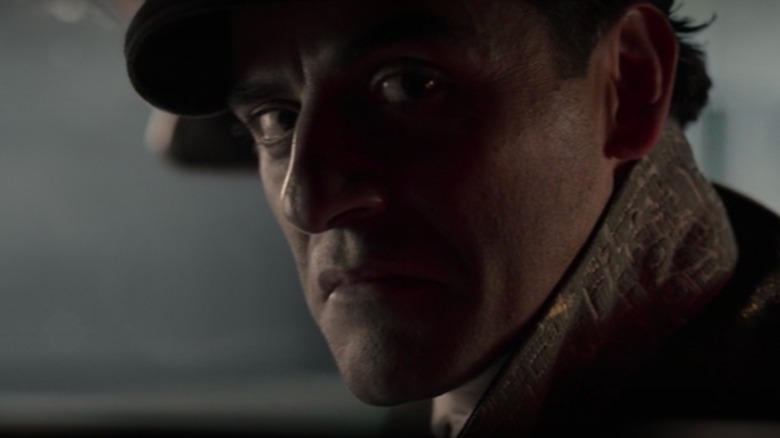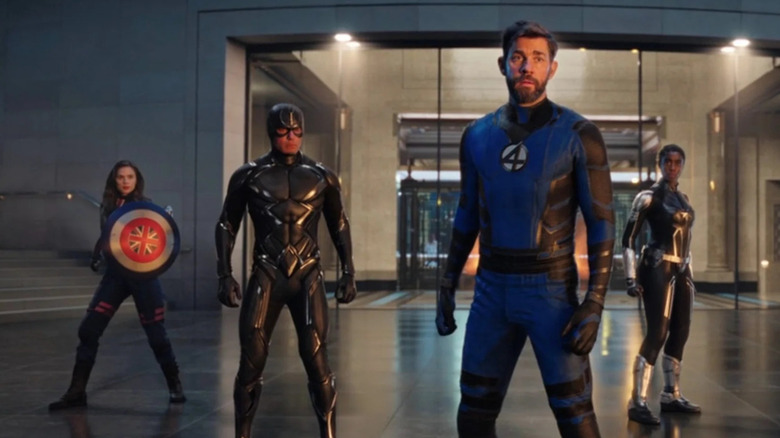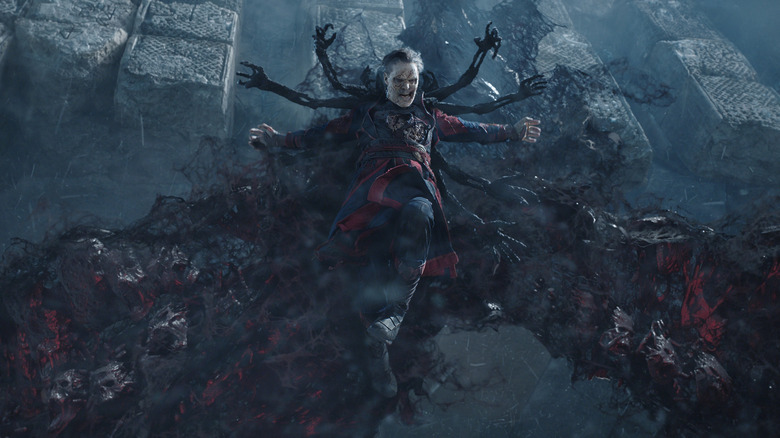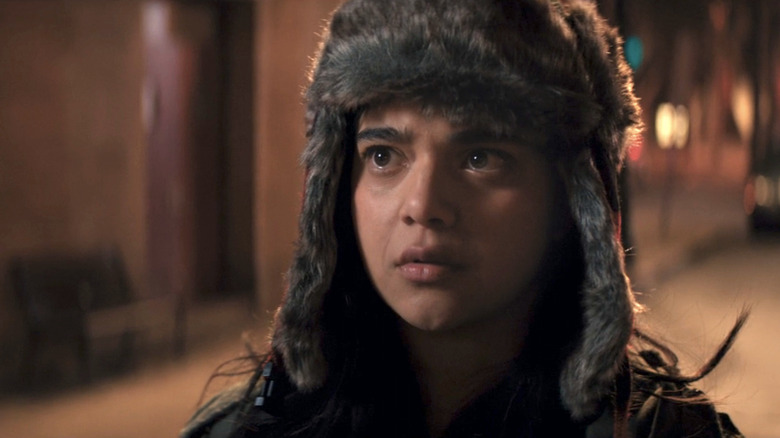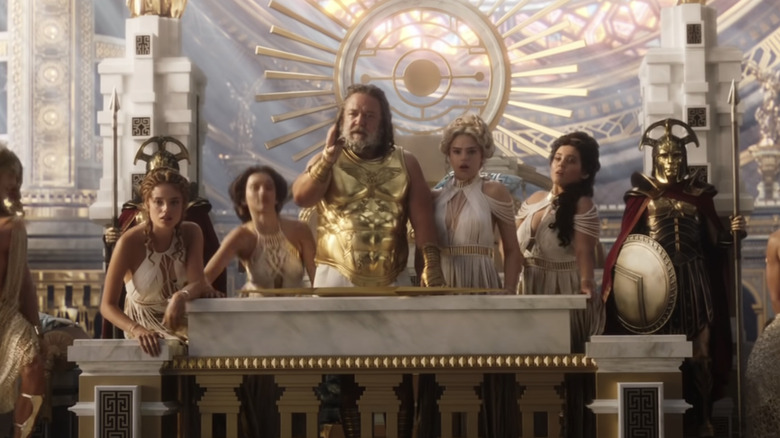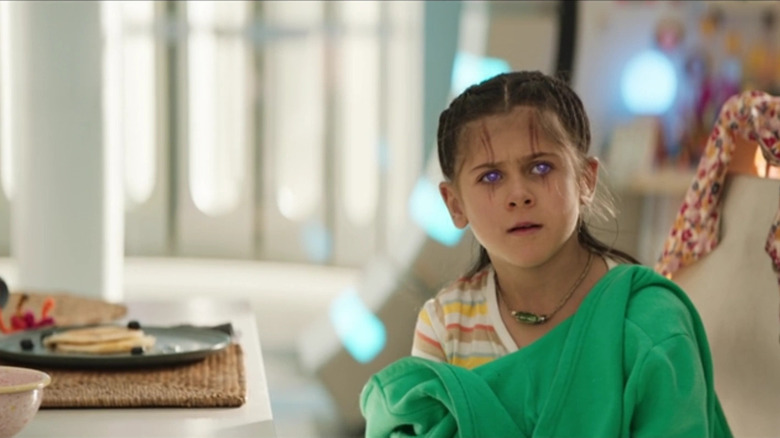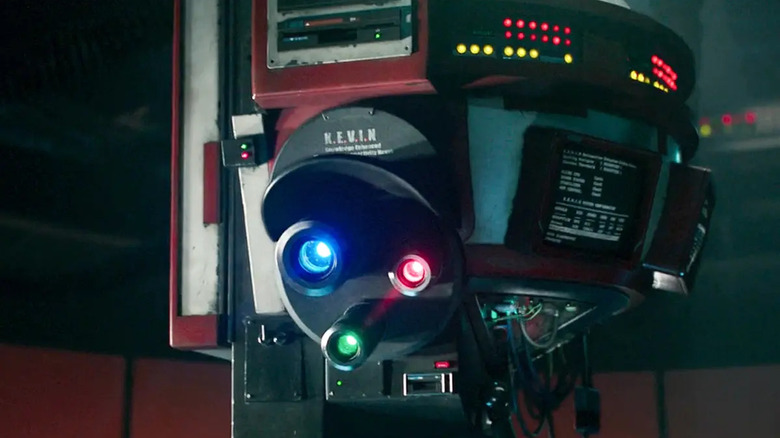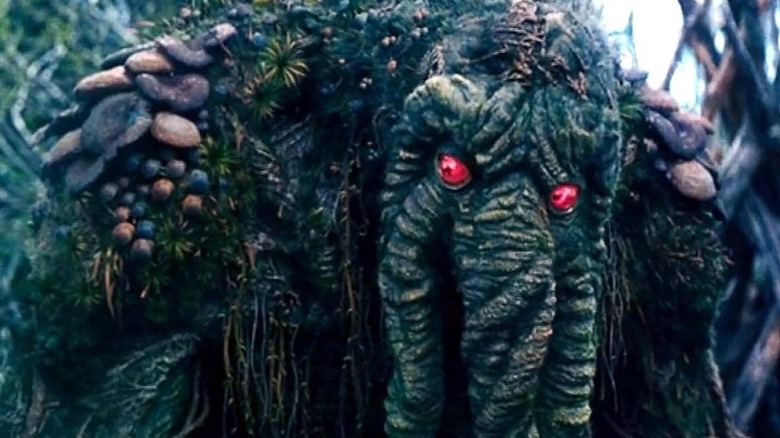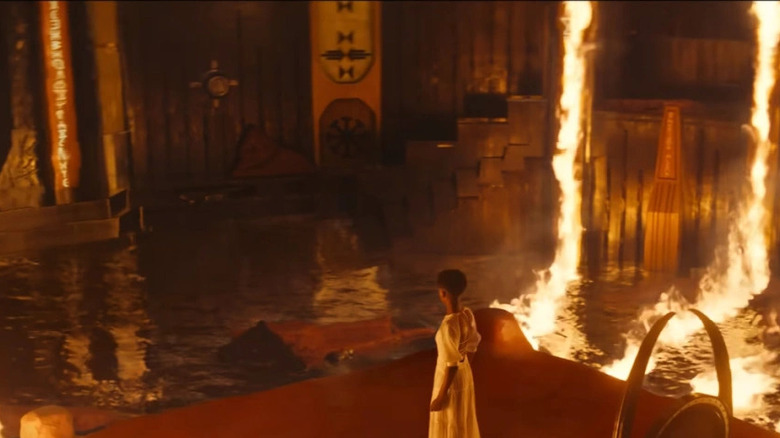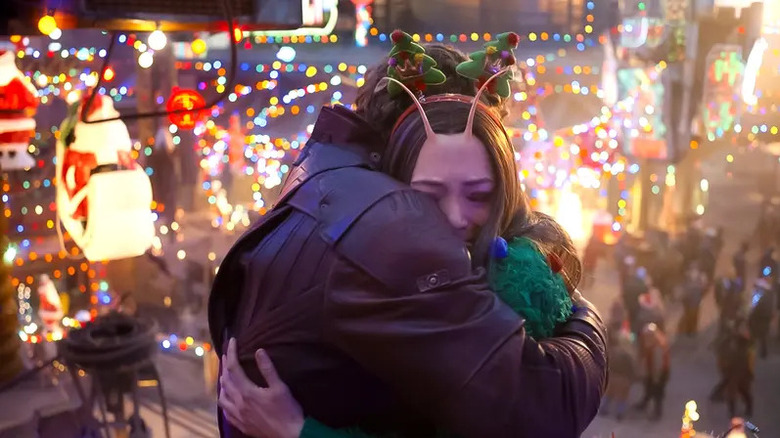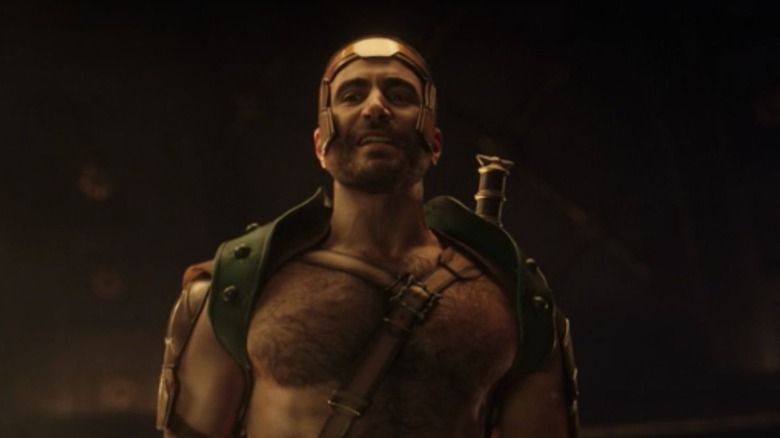The Biggest MCU Surprises Of 2022
The MCU got weirder, more ambitious, and (let's be honest) a little less consistent in Phase 4. The franchise was bound to suffer from a comedown after the heights it reached with "Avengers: Endgame," especially since Phase 4's stories were largely about grief and existential crisis. That began in 2021 with movies and TV shows like "Black Widow" and "WandaVision," and continued into 2022 with Phase 4's final film, "Black Panther: Wakanda Forever," featuring thrilling and confounding tales of the multiverse, magic, gods, and monsters. They may not have all risen to the audience's high expectations, but they tried new things and often surprised and delighted us.
This year gave fans a diverse slate of bold, genre-heavy theater experiences. There was Sam Raimi's horror-infused "Doctor Strange in the Multiverse of Madness," Taika Waititi's tongue-in-cheek, '80s rock-inspired "Thor: Love and Thunder," and Ryan Coogler's reverent "Black Panther: Wakanda Forever." It also continued the MCU's Disney+ project with "Moon Knight," about a man with dissociative identity disorder, "Ms. Marvel," about a teenage Marvel super fan and her disapproving Pakistani family, and "She-Hulk: Attorney at Law," a self-aware procedural comedy. Finally, Marvel Studios pioneered special presentations with "Werewolf by Night" and "The Guardians of the Galaxy Holiday Special."
That each property varied so much in tone and style meant that, even if we could guess some of the big reveals, we never really knew what was coming next. These were the most surprising developments in the MCU o 2022.
Layla becomes Scarlet Scarab
"Moon Knight" was, by and large, Oscar Isaac's show. The accomplished actor, who's as comfortable in blockbusters like "Star Wars" as he is in intimate dramas like "Inside Llewyn Davis," was a fitting choice to play a superhero with dissociative identity disorder. One of his alters is Steven Grant, a meek museum gift shop employee. Another is Marc Spector, a confident mercenary who is the avatar of the Egyptian god Khonshu. Steven meets Layla El-Faouly (May Calamawy), an Indiana Jones type who is also Spector's estranged wife. She's upset that her husband has abandoned her, and he can't believe he'd ever screw things up with such an incredible woman.
Layla spends most of the series with an alternately awestruck, scared, and confused Steven. It's fun to watch her as she confidently helps this alter of her partner in love and archaeology uncover tombs and escape henchmen. Still, Calamawy never has as much to do as Isaac, and there isn't much development of her character that hints at a last-act twist.
However, in the finale, Layla becomes the avatar of Taweret — the Egyptian hippo goddess who previously explained the afterlife to Marc and Steven — in an attempt to stop Harrow (Ethan Hawke) and the god of judgment, Ammit. Though never mentioned by name, Layla has transformed into the MCU's version of the Marvel Comics character Scarlet Scarab. Her superhero stance with metallic wings extended makes for one of the most exciting moments in "Moon Knight."
Jake Lockley's here after all
"Moon Knight" proves that the MCU likes to keep us guessing until the very end. Fans of the obscure Moon Knight knew that in the comics Steven and Marc have a third identity, Jake Lockley. Those readers anticipated Oscar Isaac might get the chance to play this grittier alter, often portrayed as a cab driver with a busted nose. The show peppered in clues throughout, though many were very subtle. Whenever Moon Knight resorted to violence, the audience rarely saw it. Steven simply came to, disoriented. Most fans assumed it was Marc causing the bloodshed, but some suspected Jake could be to blame.
In a trippy sequence at the end of Episode 4, Marc and Steven — trapped in a surreal psychiatric hospital together — pass by a locked sarcophagus. Some guessed that Jake was inside. Then, in Episode 5, who we think is Steven has an odd therapy session in another not-necessarily-real hospital room with Dr. Harrow, but he has a deep cut on the bridge of his nose and his accent falters.
The finale proper came and went without confirmation of Jake Lockley, but the mid-credits scene left no doubt. Harrow is wheeled out to a limo. His driver, wearing Jake's preferred cap, kicks his wheelchair to the side while Khonshu waits in the back seat. We learn that the Moon god let Marc and Steven off the hook because Jake Lockley was there, happy to do his bidding.
Wanda disposes of Earth-838's Illuminati immediately
Rumors had been spreading that some major celebrities and as-of-yet-unseen characters might make their MCU debuts in "Doctor Strange in the Multiverse of Madness." A trailer featuring Patrick Stewart's voice only added to the speculation that Professor X and the Illuminati could appear in the sequel. Sure enough, partway through the film, there was Charles Xavier, seated next to Anson Mount's Black Bolt, Hayley Atwell's Captain Carter, Chiwetel Ejiofor's Karl Mordo, Lashana Lynch as Captain Marvel, and John Krasinski as Reed Richards.
That Earth-838's Illuminati was in "Doctor Strange in the Multiverse of Madness" didn't come as that much of a shock. What threw viewers for a loop was how director Sam Raimi and writer Michael Waldron deployed them. Fans have eagerly awaited the addition of the X-Men and the Fantastic Four to the MCU, but filmmakers pulled the rug out from under audiences with an even bigger surprise — these alternate-universe versions of the characters weren't long for the world. Wanda (Elizabeth Olsen), in full and terrifying villain mode, killed off each member of the Illuminati in creative and disgusting ways, and she barely broke a sweat doing it.
No one will soon forget Black Bolt's imploding brain or Reed Richards turning to blue spaghetti. Raimi and Waldron's devilishly hilarious bait-and-switch gave fans exactly what they thought they wanted — then took it all away in spectacular fashion.
Strange 616 puppets a zombie
Sam Raimi is the king of kitschy horror. With the man behind "The Evil Dead" in the director's chair for "Doctor Strange in the Multiverse of Madness," fans readied themselves for the MCU to strike some new chords. They didn't know Earth-616 Stephen Strange (Benedict Cumberbatch) and his evil Earth-838 doppelganger would literally fight to the death with music notes in one of Marvel's most inventive battles yet. "Doctor Strange in the Multiverse of Madness" is full of Raimi-style flourishes like this, as playful as they are gruesome. From Gargantos' giant eyeball getting impaled with a street lamp to Wanda's chilling jump scare, the movie doesn't pull any punches — even Bruce Campbell shows up as Pizza Poppa, doomed to repeatedly punch himself.
All the madness comes to a crescendo in a dark and daring final act. To defeat Wanda and save America Chavez, Strange 616 (who is stuck on Earth-838) dream walks into Defender Strange's decaying corpse, conveniently stashed in a rooftop shed in his universe. The souls of the damned arrive to stop him — since possessing dead bodies is a major no-no — but he wins them over. A demon-enhanced zombie Strange, with broken fingers and chunks of his face missing, holds off Wanda long enough for America to show her the error of her ways.
Zombie Strange had been part of the marketing, and Marvel zombies are canonical, but few were able to figure out how this undead showdown would go down.
Kamala's a mutant
The MCU's second television series of the year was responsible for some notable firsts, not the least of which is that "Ms. Marvel" is centered around the studio's first Muslim superhero. Kamala Khan (Iman Vellani) is a 16-year-old Pakistani American living in a Jersey City apartment with her supportive yet strict family. When the series begins, all she wants is permission to attend AvengerCon and cosplay as her idol, Captain Marvel. However, her folks disapprove, so she sneaks out. Her best friend and one of many potential love interests, Bruno (Matt Lintz), makes her a pair of gloves for the costume contest. She forgets them in the bathroom and throws on an heirloom bangle bracelet instead — which (we think) turns her into a superhero in her own right.
Still, six episodes later, when it seems that the Clandestines and the Department of Damage Control have been dealt with, Bruno breaks the biggest news "Ms. Marvel" has to offer. Before leaving for Caltech, he tells Kamala that she possesses a genetic mutation, which means her powers don't come exclusively from the bracelet. The Marvel Comics Kamala might be an Inhuman, but MCU's Kamala is a mutant!
Forget Patrick Stewart's stunt cameo on Earth-838 – this is what fans of "X-Men" have been waiting for since Disney acquired Fox. Just in case audiences thought it was a coincidence, showrunners added a few bars of the animated "X-Men" theme music to the scene for good measure.
Zeus is comic relief
About a year before "Thor: Love and Thunder" premiered, fans learned that Russell Crowe would be joining the MCU as Zeus. Zeus is both a fixture of Greek mythology and a character in Marvel Comics, where he's a leader of the Olympians who interacts with the Eternals, the Guardians of the Galaxy, and the Norse gods of Asgard. Crowe is best known for playing Maximus in Ridley Scott's epic historical drama and best picture winner, "Gladiator," a physically challenging and emotionally complex role that earned him an Oscar of his own for best actor.
It's certainly plausible that the man who played Maximus two decades ago could play Zeus today. Perhaps because Crowe often appears in serious films as conflicted characters, fans may have expected his Zeus to be powerful yet dour. Instead, Crowe — as we've never seen him before — gave us Zeus turned loose. Once viewers caught a glimpse of those foppish ringlets and that ill-fitting gold breastplate, accompanied by that ridiculous Greek accent, it became clear that this god of the sky was a source of Taika Waititi's trademark brand of comic relief.
Like Waititi's send-up of Hitler in "Jojo Rabbit," Crowe's Zeus is a deeply silly satirization who prances around with his toga mini-skirt pinched between his fingers and threatens to ban anyone who upstages him before the annual orgy. He's a riot and an effective foil to Thor, embodying an apathetic god who is everything Gorr loathes.
Thor becomes a foster parent
The headlines around "Thor: Love and Thunder" mostly had to do with Natalie Portman's return as Jane Foster. Not only that, she was getting promoted to true co-star and would appear alongside Chris Hemsworth's Thor as Mighty Thor. When fans speculated about the plot, they mostly wondered whether she might be the one wielding Mjolnir going forward. Others wondered whether Sif, Korg, or Valkyrie might die or whether Christian Bale's Gorr the God Butcher might live to threaten the MCU's growing cast of gods in future installments. What no one saw coming was that "Thor: Love and Thunder" would end with the God of Thunder becoming a foster parent to a little girl named Love.
We witness the moment that radicalizes Gorr in the film's opening. Gorr prays to his deity, Rapu, to save his daughter's life. His prayers go unanswered as she dies in his arms and he learns why when he comes face to face with an unfeeling, indulgent Rapu. Gorr vows to rid the world of gods.
However, when he reaches eternity and can enact his plan, he chooses to give his daughter another chance at life instead. Thor functionally adopts the girl (played by Hemsworth's daughter, India Rose) who hates "pan flaps" but enjoys painting faces on Mjolnir. Still, we don't know if Thor will be in dad mode for long or if Love will be a consequential part of the MCU's next phases.
A Knowledge Enhanced Visual Interconnectivity Nexus
"She-Hulk: Attorney at Law" strays from the standard MCU script, even when compared to creatively ambitious shows like "WandaVision" and "Loki." When Jennifer Walters (Tatiana Maslany) inadvertently becomes a Hulk after her blood is contaminated with her cousin Bruce Banner's, she eschews the superhero lifestyle for her already-in-progress legal career. The result is a workplace comedy that plays like "Ally McBeal" or "Parks and Recreation" — if Ally or Leslie Knope had been exposed to gamma radiation. "She-Hulk" frequently breaks the fourth wall and functions almost like a meta-commentary on the MCU and its fandom in real-time.
Despite setting itself apart genre-wise, the series ultimately brought more canon into the franchise. It made Tim Roth's Emil Blonsky-slash-Abomination (from 2008's "Incredible Hulk") one of Jennifer's clients, and Charlie Cox's Matt Murdock-slash-Daredevil (now officially in the MCU) her adversary as both a lawyer and superhero as well as her love interest.
Still, the cleverest joke and character introduction came in the finale of "She-Hulk: Attorney at Law," when Jennifer storms into Marvel offices to have a word with writers. Turns out, a knowledge-enhanced visual interconnectivity nexus, otherwise known as a K.E.V.I.N. — is the one responsible for the decision-making. This nod to Marvel Studios president and overseer of the entire MCU, Kevin Feige, isn't a true Stan Lee-style cameo — regrettably, K.E.V.I.N. is not voiced by the man himself.
Hey, it's Man-Thing!
The first-ever Marvel special presentation, "Werewolf by Night," dropped onto Disney+ around Halloween with minimal fanfare. It was a test of sorts for one-off stories that didn't warrant a feature-length film or a multi-episode arc. That "Werewolf by Night," from composer and first-time director Michael Giacchino, was so good was a pleasant surprise in and of itself. The mostly black-and-white, low-fi mini monster movie is a throwback to classics from the 1930s and '40s like "Frankenstein" and "King Kong," but it has a strong voice all its own and an aesthetic unlike anything else in the MCU.
Since Marvel had announced Gael García Bernal's casting in the title role, when he arrives at Bloodstone Manor as a human monster hunter named Jack Russell, viewers know he is destined to undergo a transformation. This meant that the best trick "Werewolf by Night" had up its sleeve was the double reveal lurking in the hedge maze. In a scare worthy of its vintage inspirations, a giant arm bursts through a shrubbery and grabs Jack by the chest. A split second later, we discover it belongs to Man-Thing, a popular character from '70s-era Marvel comics.
Further, we learn that Jack isn't hunting Man-Thing — they're best buds. He's infiltrated this occult occasion at great risk to himself to spring his friend before the assembled assassins can torture and kill him. Man-Thing's design and his sweet relationship with Werewolf by Night were two unexpected highlights of the MCU's 2022.
Killmonger waits for Shuri in the Ancestral Plane
"Black Panther: Wakanda Forever" faced enormous challenges after Chadwick Boseman's tragic death, and the way the sequel processes his loss is the film's greatest strength. "Black Panther: Wakanda Forever" begins and ends with moving tributes to the late Boseman and his iconic character, T'Challa, primarily communicated from the perspective of his little sister, Shuri (Letitia Wright). In between, Shuri wrestles with the mantle of leadership herself, and that journey culminates in a trip to the Ancestral Plane after ingesting the synthetic heart-shaped herb she's invented. She expects to see a family member as T'Challa did — perhaps even her recently departed mother, Ramonda (Angela Bassett). Instead, her cousin Killmonger sits on her family's throne.
Fans were curious to see if Killmonger, who died in 2018's "Black Panther," might appear in the sequel, especially after the anti-hero was so well-received. Some even wondered if director and co-writer Ryan Coogler might find a way to bring him back from the dead and promote him to the role of the titular superhero. As "Black Panther: Wakanda Forever" approached the two-hour mark without a Killmonger sighting, audiences may have forgotten it was a possibility.
However, using this supernatural setting was the perfect way to resurrect him — without having to actually resurrect him. The tension between him and Shuri makes the scene much more interesting. Rather than her mother, father, or (heaven forbid) a CGI version of her brother offering support, Killmonger tests her convictions.
Peter Quill and Mantis are half-siblings
The second special presentation of 2022 was James Gunn's "The Guardians of the Galaxy Holiday Special," a spitballed idea for a parody of a Christmas special that became a reality and was filmed concurrently with "Guardians of the Galaxy: Vol. 3." This 40-minute musical mash-up is even more random and irreverent than films featuring the Guardians usually are, and it's stuffed full of gleeful Easter eggs.
The plot revolves around a fantastic callback joke that probably made more of an impact on people who hadn't seen the cast list. Drax (Dave Bautista) and Mantis (Pom Klementieff) want to get Peter Quill (Chris Pratt) the best Christmas present ever — his hero, Kevin Bacon. The actor was referenced in the first film when Star-Lord cited "Footloose" before his climactic dance battle with Ronan. Bacon doesn't make a cameo, instead playing a major role, falling under Mantis's influence and even performing a song.
However, "The Guardians of the Galaxy Holiday Special" ends with a development that matters much more to the MCU in the long run. Mantis has been keeping a secret — she's Ego's daughter, which means she's Quill's half-sister. Drax knows, but she's afraid to tell Peter as it might dredge up painful memories about his mother's death. After the presents have been exchanged and Kevin Bacon heads home, Mantis decides to come clean. Peter is (as one would expect in a holiday special) thrilled at the news that he and Mantis are family.
Meet the new mid-credits characters
After dozens of films, MCU fans know to stick around for mid and end-credits stingers, which often have two purposes. They give filmmakers one last gag, and more importantly, they tease new storylines and characters. It's a tradition that goes back to the very beginning. We first met or heard about Nick Fury, Thor, Thanos, Wanda Maximoff, Captain Marvel, Adam Warlock, Blade, Pip, and Eros this way. This year alone, audiences were introduced to three new additions to the MCU's roster — four if you count Jake Lockley.
First up in 2022 was Charlize Theron, who appeared as a multiverse traveler who confronts Doctor Strange in the street. He follows her into what appears to be the Dark Dimension, but not before an ominous third eye manifests on his forehead. Though only named in the credits, this is Clea, Doctor Strange's love interest from the comics. Next, in "Thor: Love and Thunder," a miffed Zeus with a gaping hole in his chest calls upon Hercules to avenge him. Who shows up? None other than the lovable grouch of "Ted Lasso," Brett Goldstein. Finally, the lone mid-credits scene from "Black Panther: Wakanda Forever" shows Shuri meeting her nephew, T'Challa Jr., for the first time.
Of course, with Bob Iger reinstalled as CEO of Disney and with the MCU reassessing its path forward, it remains to be seen how big of a role Clea, Hercules, or T'Challa will play in Phases 5 and 6.
